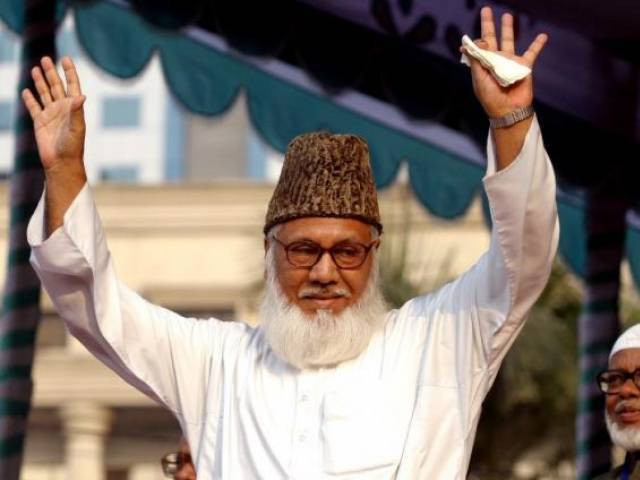Pakistan reacts angrily to Dhaka execution of JI leader
Foreign Office says Bangladesh killing opposition leaders through flawed trials

Moulana Motiur Rahman Nizami, chief of the Jamaat-e-Islami in Bangladesh. PHOTO: REUTERS
The Foreign Office said in a statement that Pakistan was ‘deeply saddened’ as parliament voiced ‘serious concerns’ and hundreds of politico-religious workers offered prayers for Nizami in different cities of the country.
Dhaka Tribunal: Pakistan concerned at JI chief’s death sentence
Motiur Rahman Nizami, 71, was hanged at a Dhaka prison after he refused to appeal for clemency against the death sentence handed down following his conviction for genocide and other war crimes during the 1971 war.
But the Foreign Office said: “His [Nizami’s] only sin was upholding the constitution and laws of Pakistan.” It added that the “act of suppressing the opposition by killing their leaders through flawed trials is completely against the spirit of democracy.”
It went on to say that Nizami’s execution was also unfortunate for the people of Bangladesh who had elected him as their representative in parliament.
Since the beginning of the war crime trials, several international organisations, human rights groups and international legal figures have raised objections to the court proceedings, especially regarding fairness and transparency, as well as reported harassment of lawyers and witnesses representing the accused, the statement reads.
“The international community has objected to the steps taken by government of Bangladesh to impose restrictions on the independence of judiciary.”
Clashes in Bangladesh after Jamaat leader's hanging
The Foreign Office recalled that as part of the 1974 Tripartite Agreement, the government of Bangladesh had “decided not to proceed with the trials as an act of clemency”.
The government of Bangladesh therefore should uphold its commitments as per the agreement, the Foreign Office demanded. “Pakistan offers condolences to the bereaved family members and the followers of Nizami.”
The National Assembly, meanwhile, unanimously passed a resolution condemning Nizami’s execution. When the house convened, Jamaat-e-Islami lawmaker Sahibzada Tariqullah requested MPs to offer Fatiha for Nizami, and demanded that the government take action on the execution.
Later Minister for Science and Technology Rana Tanvir Hussain moved a resolution signed by several MNAs condemning the execution.
“Executing political opponents in Bangladesh is equivalent to rubbing salt into the wounds, and the government should stop such human rights violations through the UN, human rights organisations and Muslim countries,” reads the resolution.
PkMAP chief Mehmood Khan Achakzai proposed that the government forms a parliamentary committee that should visit Bangladesh in coordination with the Foreign Office for talks on the issue. Speaker Ayaz Sadiq agreed, saying a mere resolution would not suffice.
Bangladesh hikes security after top Islamist hanged for war crimes
Minister for Railways Khawaja Saad Rafique said executions of political opponents in Bangladesh was a serious issue which was also causing unrest among the Pakistanis. JUI-F lawmaker Amir Zaman demanded that the government summon Bangladesh’s ambassador to the Foreign Office to lodge a strong protest.
Jamaat-e-Islami Ameer Sirajul Haq led hundreds of workers of his party at a funeral-in-absentia arranged by his party for Nizami in Lahore.
Haq deplored that the Pakistan government had not made any serious effort to stop Nizami’s hanging. He added that he had repeatedly asked Premier Nawaz Sharif, Interior Minister Chaudhry Nisar Ali Khan and other senior officials to take up the matter with Bangladesh’s prime minister.
“I had also met the ambassadors of Saudi Arabia, Iran, Yemen and some other countries who promised support if Pakistan raised the issue with Dhaka,” he said but regretted that the rulers in Islamabad did nothing.
Similar prayers were also offered in Peshawar for Nizami. JI’s provincial ameer Mushtaq Ahmad Khan led the mourners at the funeral prayers. “Nizami, a disciple of [JI founder] Maulana Abul Ala Maududi, was executed for his love for Pakistan,” Khan said while addressing on the occasion. Funeral in absentia was also offered in Karachi, Faisalabad and Islamabad attended by a large number of workers.
Published in The Express Tribune, May 12th, 2016.



















COMMENTS
Comments are moderated and generally will be posted if they are on-topic and not abusive.
For more information, please see our Comments FAQ